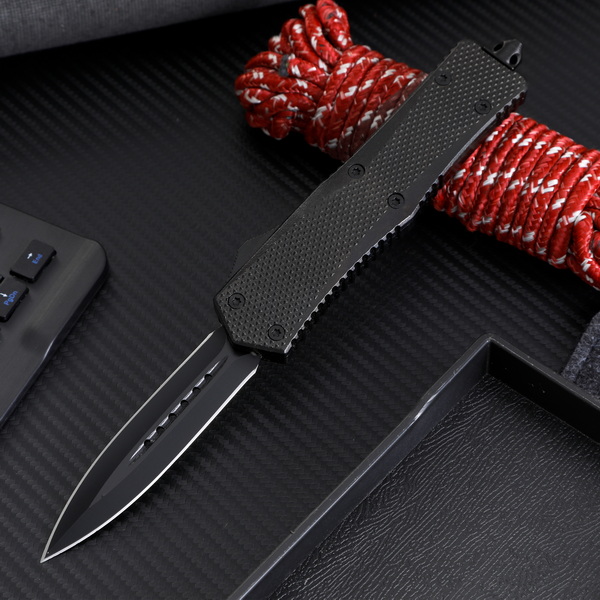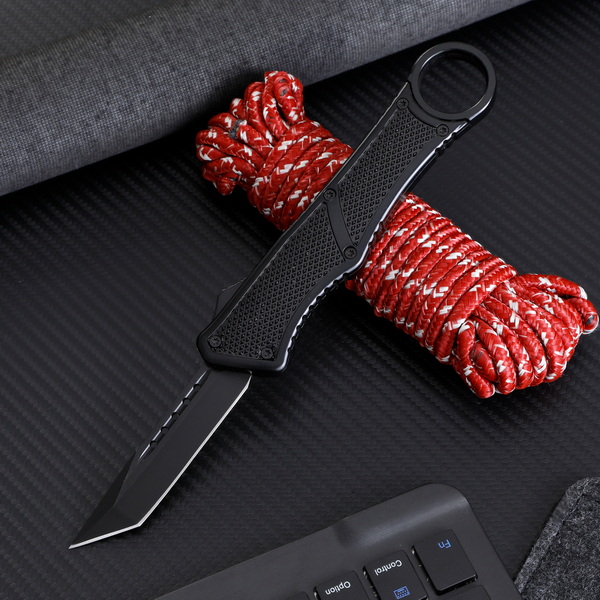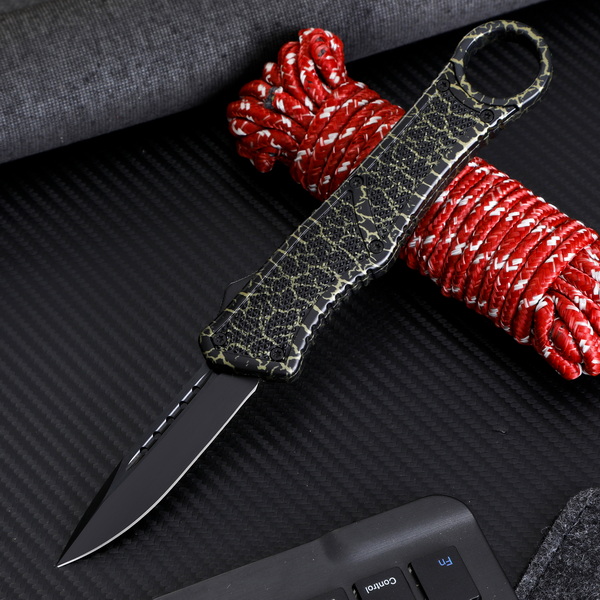Views: 222 Author: Leah Publish Time: 2025-11-02 Origin: Site











Content Menu
● I: The fundamentals of OTF knives for EDC
● II: Design trends shaping 2025 OTFs
● III: Materials, manufacturing, and why OEMs succeed
● IV: OEM-focused strategies for 2025 markets
● V: Practical guidance for collaborating with foreign brands
● VIII: Case study concepts for OEM success
● IX: Content creation best practices for reviews and marketing
● FAQ
>> 1) What defines an OTF knife, and how does it differ from other knife types?
>> 2) Are OTF knives legal to own or carry in all markets?
>> 3) Why might an OEM partnership be advantageous for OTF knives?
>> 4) What materials are typically used in high-quality OTF knives in 2025?
>> 5) How should end users maintain OTF knives to ensure longevity?
In the fast-evolving landscape of outdoor tools and tactical gear, Out-The-Front (OTF) knives continue to capture the attention of professionals and enthusiasts who demand rapid deployment, reliable performance, and robust construction. For brands engaging in OEM partnerships, understanding the 2025 market means analyzing material science, deployment mechanisms, safety features, and regulatory considerations. This article dives deep into design trends, material choices, manufacturing best practices, and market-facing strategies for Tactical OTF Knives used in everyday carry (EDC). The aim is to illuminate how Chinese manufacturers can partner effectively with foreign brands, wholesalers, and production houses to deliver high-quality, brand-consistent OTF products that meet global expectations.

OTF knives deploy the blade automatically from the handle, offering one-handed operation that can be critical in time-sensitive scenarios. For EDC, the ideal OTF knife blends deployment speed with safety, ergonomic comfort, and long-term durability. Key considerations for OEM programs include:
- Deployment reliability: a smooth, consistent action with minimal play or wiggle that can be replicated across thousands of units.
- Safety design: built-in safeguards against unintended deployment, plus secure locking mechanisms when the blade is closed.
- Material quality: corrosion-resistant steels, durable handle materials, and coatings that resist wear in diverse climates and activities.
- Maintenance practicality: ease of disassembly, lubrication paths, and standardized spare parts to support regional service networks.
- Blades and steels: 2025 models favor high-performance stainless steels and advanced carbon alloys with improved wear resistance and edge retention. Coatings and finishes (e.g., PVD, DLC, cerakote) extend blade life in harsh environments.
- Handle ergonomics: textured G-10, reinforced polymers, and aluminum scales with ambidextrous pocket clips improve grip, heat dissipation, and user comfort in gloves.
- Deployment mechanics: refinements in spring force, detent design, and lubrication pathways reduce misdeployment and prolong mechanism life.
- Safety features: dual-action safeties, rear-locking safeties, and tactile feedback can reduce accidental deployments while preserving quick access.
- Blade materials: select steels with a balance of hardness, toughness, and corrosion resistance; heat treatment consistency is essential for uniform performance across batches.
- Housings and scales: use materials that resist wear from grit and moisture; consider coatings or anodization for durability and branding purposes.
- Tolerances and assembly: tight blade-to-scale fit, precise pivot points, and secure seals matter for reliability; a well-documented BOM and QA protocol help with cross-border supply chains.
- Quality assurance: implement deployment-cycle tests, corrosion exposure tests, and field simulations to verify performance before shipping.
- Product customization: offer colorways, logo placements, packaging variants, and region-specific manuals to align with local consumer expectations and regulatory requirements.
- Packaging and branding: design packaging that protects the knife during international transport while reinforcing the brand's identity and value proposition.
- Spare parts and serviceability: establish a modular parts system and easy-to-source components to support distributors and end-users across different regions.
- Compliance and documentation: provide clear safety notes, origin certificates, and import-compliance documents to facilitate market entry in countries with strict regulations on automatic knives.
- Clear specs: deliver precise CAD models, material specs, heat-treatment parameters, and QA criteria to ensure consistency across production lots.
- Prototyping and validation: run iterative prototypes to validate deployment speed, safety mechanisms, and user experience before mass production.
- Lead times and MOQs: align expectations regarding minimum order quantities, tooling costs, and manufacturing lead times to minimize supply chain risk.
- After-sales support: plan for warranties, spare parts supply, and service centers to maintain brand trust in international markets.
- Global demand drivers: outdoor recreation growth, private-label opportunities, and the demand for reliable OEM products that can be quickly integrated into international distribution networks.
- Competitive landscape: a mix of established brands and rising manufacturers; differentiation often rests on material quality, consistency, and service infrastructure rather than price alone.
- Regulation considerations: varying restrictions on automatic knives by country; proactive compliance planning is essential for avoiding delays or market access problems.

- Private-label collaboration: a color-matched private-label OTF line with branded packaging can open new retail channels and improve shelf presence.
- Channel strategy: tiered SKUs for online marketplaces, specialty shops, and regional distributors helps optimize pricing, stock turns, and service coverage.
- Value proposition: emphasize reliability, training support for end users, and transparent warranties to build brand loyalty.
- Data-driven evaluations: present objective metrics such as deployment speed, blade edge retention, corrosion resistance, and field performance.
- Balanced storytelling: combine practical demonstrations with honest analysis of trade-offs like maintenance requirements or price points.
- Authenticity: avoid overstatement; provide context for how an OEM partner's design choices translate into real-world benefits for end users.
The 2025 landscape for Tactical OTF Knives remains dynamic, anchored by material science advances, refined deployment mechanisms, and enhanced manufacturing processes. For Chinese OEM manufacturers, success in international markets hinges on rigorous quality assurance, flexible customization, and a resilient supply chain. By prioritizing predictable performance, regulatory awareness, and responsive after-sales support, OEM collaborations can deliver OTF knives that meet or exceed the expectations of foreign brands, wholesalers, and production partners.

An OTF knife deploys the blade automatically from the front of the handle via an internal mechanism, enabling rapid one-handed access; this differentiates it from folding or fixed-blade knives, which require separate deployment or stationary blades.[1]
Legislation varies widely by country and region; before distribution or sales, verify local laws and obtain any required permits or exemptions.[1]
OEM collaborations enable customization, scalable production, standardized quality, and streamlined distribution across international markets, with brand-specific packaging and support.[11]
Commonly, blade steels with good edge retention and corrosion resistance, combined with aluminum, G-10, or reinforced polymer handles and protective coatings.[1]
Regular cleaning, lubrication of the deployment mechanism, inspection of locking components, and adherence to manufacturer maintenance guidelines are essential for reliable operation.[7]
[1](https://www.tacticalsportinggoods.com/blogs/news/ultimate-guide-to-the-top-10-otf-knives-of-2025-features-reviews-and-recommendations)
[2](https://www.vipertecknives.com/blogs/all-tactical/the-best-viper-tec-otf-knives-for-everyday-carry)
[3](https://www.gearpatrol.com/outdoors/best-new-knives-multi-tools-edc-2025/)
[4](https://www.bladehq.com/blog/best-otf-knives)
[5](https://blade-city.com/blogs/gun-knife-blog/the-best-automatic-pocket-knives-of-2025-for-everyday-carry)
[6](https://smkw.com/knife-101-best-otf-knives-of-2025)
[7](https://hiconsumption.com/gear/best-otf-knives/)
[8](https://knife-depot.com/blogs/sharpened-values/top-10-everyday-carry-edc-knives-in-2025)
[9](https://shotshow.org/new-knives-coming-in-2025/)
[10](https://www.fieldandstream.com/outdoor-gear/hunting/knives/best-automatic-knives)
[11](https://www.58hrcknives.com/top-custom-otf-knife-manufacturers-you-should-know-in-2025.html)
Tactical OTF Knives vs Automatic Knives: What You Need to Know
How Tactical OTF Knives Enhance Outdoor and Survival Performance
Why Tactical OTF Knives Are Gaining Popularity Among Professionals
Tactical OTF Knives vs Folding Knives: Key Performance Comparisons
Tactical OTF Knives vs Fixed Blade: Which Is Better for Outdoor Survival